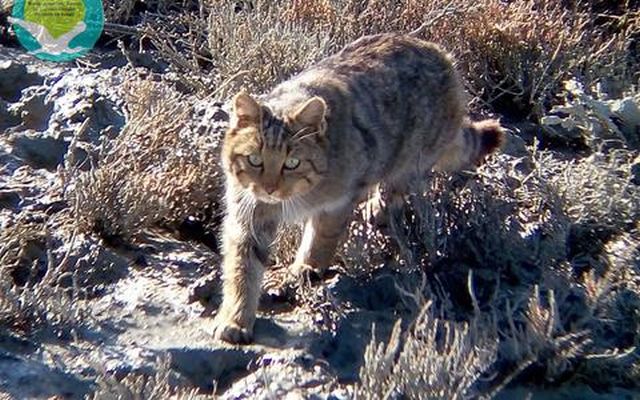A European wildcat, a rare and endangered species of mammals, was spotted a few days ago in the area of the River Kalamas, Epirus region in northern Greece. The graceful animal was walking among the reeds, posing in front of the lens of researchers from the management centre for the Rivers Aherondas and Kalamas, who were watching the wildcat with great interest.
"The European wildcat looks like the ordinary domestic cat but is twice as big, the male is even bigger, and has large limbs. Its fur colour changes from greyish-brown to greyish-yellow with dark stripes and spots on the body, depending on the season. Its tail is shorter than that of the domestic cat, with thick fur and bright black rings", head of the Centre Theodoros Komninos told Ethnos newspaper.
In recent years, scientists have seen the European wildcat in the forests of Northern Pind, near towns and villages, and in riparian areas. However, this species remains rare for Greece. It is a protected species under Directive 92/43/EEC, CITE and the Red Book (as well as the Cretan wildcat, as it genetically differs from the wildcats in the rest of the country).
As stated by biologist from the Centre Evi Sintihaki, the European wildcat has appeared many times at the River Kalamas delta, among the reeds and bushes in the areas monitored by the security staff on a daily basis. The wildcat avoids humans and people have often mistaken it for the ordinary domestic cat and wonder how such a big cat has found itself there.
"Due to the remoteness of the protected areas the wildcat is able to survive, living away from human activity. Like other cats, it lives a settled life, for the most part, and usually waits for its victims, suddenly attacking them with one jump. It goes hunting away from the cover of the forest, in open spaces, perhaps to find food, very rarely and under exceptional circumstances," explains Evi Sintihaki.

The wildcat has extremely developed senses, which in combination with its high intelligence helps it feel natural hazards on time. It can even immediately smell the danger. Its characteristic large claws, sharp teeth, very sharp eyesight and hearing, its ability to climb trees easily, make it a strong and, at the same time, a very dangerous predator.
The European wildcat is not amenable to domestication, it does not like human presence and does not respond to a call. Over the past 250 years, its population has significantly decreased due to the destruction of forest areas and human activity. The female gives birth to 5-6 young, almost half of which die prematurely. The survivors develop rapidly; when they are one year old, they are weaned from the mother, and normally eat birds, rodents and small mammals, never corpses, and look for a partner.
The largest populations are found in remote forest areas, particularly in the deciduous forests of Scotland, France, Italy and much of Russia. In Greece, representatives of the European wildcat are registered across the central and northern part of the country, mainly in riparian areas and wetlands. A necessary condition for the emergence of the wildcat is the presence of dense vegetation.
In Crete, there are several representatives of a subspecies of the European wildcat, or maybe of the African wildcat, which is the Cretan wildcat. In 1996, Italian scientists and associates of the biological faculty of the University of Crete had tracked a representative of the Cretan wildcat with a radio collar, arriving at some interesting conclusions.